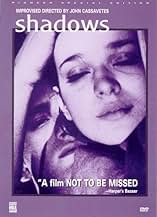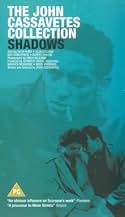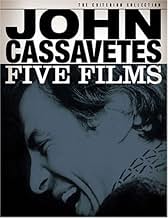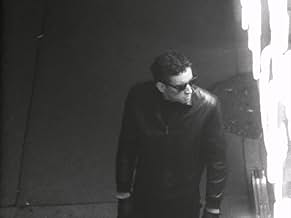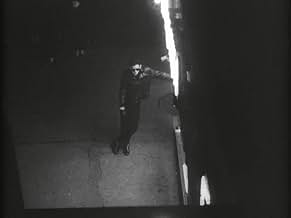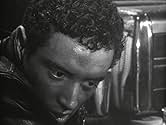Cassavetes' jazz-scored improvisational film explores interracial friendships and relationships in Beat-Era (1950s) New York City.Cassavetes' jazz-scored improvisational film explores interracial friendships and relationships in Beat-Era (1950s) New York City.Cassavetes' jazz-scored improvisational film explores interracial friendships and relationships in Beat-Era (1950s) New York City.
- Director
- Writers
- Stars
- Nominated for 4 BAFTA Awards
- 2 wins & 5 nominations total
David Jones
- Davey
- (as Davey Jones)
- Director
- Writers
- All cast & crew
- Production, box office & more at IMDbPro
Featured reviews
In the end credits of "Shadows", after we read 'directed by John Cassavetes', some white letters on the screen can be seen: "The film you have just seen is improvised", they say. I am always pursuing the fact that words are so important in movies since filmmakers started using them because, basically, there's no film without a screenplay and many other reasons.
Cassavetes pursued the same goal, and he believed in the freedom of words; "Shadows" is the perfect example. It's a film with no real main characters, with no real main plot lines; it's mostly people in different situations, talking. Yes, some of the situations are connected but Cassavetes, apparently always in a rush to get to the talking, uses a fast forward technique when the characters are going somewhere or escaping from someone and are not speaking.
Appearances are everything in this movie. For example, there's a brilliant score, full of jazz influences and a lot of fantastic solos, and there's one character that says he's a jazz musician and plays the trumpet (Ben, all the characters' names are the same names the actors'). However, we never see him play the trumpet or jam with a band; he doesn't even talk about music and just wanders with his friends around the city. They do talk, a lot, and about anything that's in their minds; going from how intelligent each of them are to the hilarious analysis of a sculpture.
"Shadows" is funny in its intellectual references in parts like the one above, because these friends are not cultured. The only important female character in the film (Lelia), though, wants to be an intellectual. But again, she has one very interesting conversation with an older man at a party, about a book she's trying to write, and about how to confront reality; but nothing to do with being intellectual. At that same party, a woman is actually making an intellectual statement, full of complexity, and asks a guy beside her: "Do you agree?". "Yes", he says, but you can tell he doesn't know what she's talking about.
Another character, a singer (Hugh), talks about his glory days in occasions, and we see him perform only once; but no references to the musical industry there. The focus of Cassavetes is the singer's relationship with his manager (Rupert), which most of the time involves chats about trivial stuff and not real 'musical' talks. So the trumpet player's important deal in "Shadows" is the time he spends with his friends; the intellectual wannabe girl's is her way of handling romantic relationships (one of the movie's strong points) and the singer's is the bond with his manager Appearances.
The reason why performances are not important in this movie is simple. Cassavetes needed people who could master improvisation, without mattering if they were actually good. I believe some of them aren't, but they surely know how to improvise in a scene, and you can notice how well they do it. "Shadows" is not about performers; it's about a way of making cinema, based on the magic of conversation; and there you could say that performances mean something.
That's why in every conversation the camera is like a stalker, constantly on the eyes of every character, constantly looking for the expressions that come with natural speech. There's a scene where the trumpet player and his friends are trying to pick up some girls. They are three, so each of them sits beside one girl (the girls are three two) in three different tables. They all talk at the same time and the camera shoots through the table, and sometimes the friends look at each other, while they say whatever they are saying It's natural.
Cassavetes pursued the same goal, and he believed in the freedom of words; "Shadows" is the perfect example. It's a film with no real main characters, with no real main plot lines; it's mostly people in different situations, talking. Yes, some of the situations are connected but Cassavetes, apparently always in a rush to get to the talking, uses a fast forward technique when the characters are going somewhere or escaping from someone and are not speaking.
Appearances are everything in this movie. For example, there's a brilliant score, full of jazz influences and a lot of fantastic solos, and there's one character that says he's a jazz musician and plays the trumpet (Ben, all the characters' names are the same names the actors'). However, we never see him play the trumpet or jam with a band; he doesn't even talk about music and just wanders with his friends around the city. They do talk, a lot, and about anything that's in their minds; going from how intelligent each of them are to the hilarious analysis of a sculpture.
"Shadows" is funny in its intellectual references in parts like the one above, because these friends are not cultured. The only important female character in the film (Lelia), though, wants to be an intellectual. But again, she has one very interesting conversation with an older man at a party, about a book she's trying to write, and about how to confront reality; but nothing to do with being intellectual. At that same party, a woman is actually making an intellectual statement, full of complexity, and asks a guy beside her: "Do you agree?". "Yes", he says, but you can tell he doesn't know what she's talking about.
Another character, a singer (Hugh), talks about his glory days in occasions, and we see him perform only once; but no references to the musical industry there. The focus of Cassavetes is the singer's relationship with his manager (Rupert), which most of the time involves chats about trivial stuff and not real 'musical' talks. So the trumpet player's important deal in "Shadows" is the time he spends with his friends; the intellectual wannabe girl's is her way of handling romantic relationships (one of the movie's strong points) and the singer's is the bond with his manager Appearances.
The reason why performances are not important in this movie is simple. Cassavetes needed people who could master improvisation, without mattering if they were actually good. I believe some of them aren't, but they surely know how to improvise in a scene, and you can notice how well they do it. "Shadows" is not about performers; it's about a way of making cinema, based on the magic of conversation; and there you could say that performances mean something.
That's why in every conversation the camera is like a stalker, constantly on the eyes of every character, constantly looking for the expressions that come with natural speech. There's a scene where the trumpet player and his friends are trying to pick up some girls. They are three, so each of them sits beside one girl (the girls are three two) in three different tables. They all talk at the same time and the camera shoots through the table, and sometimes the friends look at each other, while they say whatever they are saying It's natural.
This is a great movie. Like it was made yesterday. Punk, beat in sensibility. About young people struggling on the fringes.
But I am mainly writing to mention that a guy named Ray Carney just wrote an astonishing book about the movie that has incredible behind the scenes details that no one ever knew before. I HIGHLY recommend it.
Cassavetes revealed things to Carney before he died in a Rosebud conversation that he had never told anyone about the film--like the fact that most of it was scripted and not improvised as the final title indicates. The book is titled Shadows and is available in any well stocked store. Carney is also the author of another WONDERFUL book titled Cassavetes on Cassavetes. Carney also has a web site that you should check out with lots of other Cassavetes material. The site is accessible from any search engine--if you type in Cassavetes' name--if you want to read even more behind the scenes stories about how Shadows and the other films were made.
But I am mainly writing to mention that a guy named Ray Carney just wrote an astonishing book about the movie that has incredible behind the scenes details that no one ever knew before. I HIGHLY recommend it.
Cassavetes revealed things to Carney before he died in a Rosebud conversation that he had never told anyone about the film--like the fact that most of it was scripted and not improvised as the final title indicates. The book is titled Shadows and is available in any well stocked store. Carney is also the author of another WONDERFUL book titled Cassavetes on Cassavetes. Carney also has a web site that you should check out with lots of other Cassavetes material. The site is accessible from any search engine--if you type in Cassavetes' name--if you want to read even more behind the scenes stories about how Shadows and the other films were made.
It ends with the declaration that "the film you have just seen was an improvisation"-at once making you feel like an idiot for thinking an improvisation was an good movie, and astounded at Cassavetes' genius...once again. Of course, Cassavetes told some guy it wasn't really an improvisation per se, on his deathbed, so...it's the story about a light-skinned black woman, Lelia, who passes for white, and her family: another passing-for-white brother named Ben, and a black-black brother named Hughie. When she falls in love with a white jerk named Tony, he is unpleasantly surprised when he finds out she's black, and from there it goes on about the three main characters' individual aspirations and shortcomings. Hughie is a jazz singer in the process of becoming a failure, Lelia's still hopelessly depressed over Tony, and Ben is angsty and violent in general, in desperate need of something to shock him out of his stale patterns of existence. Overall, I suppose it's really about stasis vs. change in human life. I suspect that Cassavetes had the plot organized enough, and it was just the dialogue that was improvised. The dialogue itself is very uneven - sometimes somebody will say something very memorable, other times it's memorably awkward. What's amazing is the extent of the amateur actors' embodiment of their characters. Cassavetes went through the acting class he was teaching at the time he decided to do Shadows, whispered in the ears of the ten best students, and this was the result...the guys playing Ben and Hughie are very good. At first I didn't like Lelia, but as the film progressed you see more and more she's one of those actors who gets better as the tension and drama builds - not necessarily the best with small talk. Shadows is hailed by many as the forerunner of the indie film movement (made in 1959) and it's definitely recommended.
What is there to say about an anti-establishment film that was produced in a time of such colourless void, social indifference and authoritarian contentment. Cassevettes first major independent film was not an instant box office success and still has not received the critical attention it deserves. I draw comparisons to this wave of American independent projects consisting of such 'Beat' filmmakers as Robert Frank and Harry Smith with the burgeoning scene emerging in Paris in the late 1950's known as the French new wave.
They discussed poetry and philosophy and vulnerability at a time when the rest of the culture was obsessed with rediscovering American cultural supremacy; even at this stage this peculiar, highly spontaneous brand of filmmaking fought against the establishment of such political lexicons and bigots that held the development of the arts in check in the mid twentieth century.
Cassevettes film examines race relations and portrays man as weak in the face of love because we, as a culture, are blinded by our own race bias and prejudice. The great element to most of Cassevettes work is that his films have almost a reversal minimalist effect; a mental reaction is evoked through subtle character relations, not so much imagery. This is why his work seems to linger because he takes a more intimate approach to defining charcters that rely less heavily on explicit actions and more upon interpretation.
Although my favourite Cassevettes film is 'Husbands', this one is his most important.
They discussed poetry and philosophy and vulnerability at a time when the rest of the culture was obsessed with rediscovering American cultural supremacy; even at this stage this peculiar, highly spontaneous brand of filmmaking fought against the establishment of such political lexicons and bigots that held the development of the arts in check in the mid twentieth century.
Cassevettes film examines race relations and portrays man as weak in the face of love because we, as a culture, are blinded by our own race bias and prejudice. The great element to most of Cassevettes work is that his films have almost a reversal minimalist effect; a mental reaction is evoked through subtle character relations, not so much imagery. This is why his work seems to linger because he takes a more intimate approach to defining charcters that rely less heavily on explicit actions and more upon interpretation.
Although my favourite Cassevettes film is 'Husbands', this one is his most important.
Shot on a minimal budget of $40,000 with a skeleton six person crew, SHADOWS offers an observation of the tensions and lives of three siblings in an African-American family in which two of the three siblings, Ben (Ben Carruthers) and Lelia (Lelia Goldoni), are light-skinned and able to pass for white. Cassavetes demanded that the actors retain their real names to reflect the actual conflicts within the group but saw the film as being concerned with human problems as opposed imply to racial ones. Cassavetes shot the film in ten minute takes and jagged editing, a reaction against 'seamless' Hollywood production values. Cassavetes main inspiration - at least in the cinematic style the film was shot - were the Italian neo-realists whilst also professing admiration for Welles' pioneering spirit. The use of amateurs and improvisation might resemble some of the Italian neo-realist directors, but with his bebop score by Charles Mingus ans Shafi Hadi, the film feels very different, very American, unlike anything made before really.
The song with the feathered girls, "I feel like a lolly-pop" (or something) feels like light years back to me, ancient history. But no matter how dated it might look, it still makes a delightful time capsule of late Fifties New York today. I think it's this is one of the first films made aspiring filmmakers realize they could shoot an independent film, without Hollywood, improvised and without a real budget. Seymour Cassel, who acted and was involved in SHADOWS, claims it was Jules Dassin's THE NAKED CITY (1948) that was the first and inspired them all, but I think this was the one that really opened the eyes of aspiring independent American filmmakers.
Camera Obscura --- 8/10
The song with the feathered girls, "I feel like a lolly-pop" (or something) feels like light years back to me, ancient history. But no matter how dated it might look, it still makes a delightful time capsule of late Fifties New York today. I think it's this is one of the first films made aspiring filmmakers realize they could shoot an independent film, without Hollywood, improvised and without a real budget. Seymour Cassel, who acted and was involved in SHADOWS, claims it was Jules Dassin's THE NAKED CITY (1948) that was the first and inspired them all, but I think this was the one that really opened the eyes of aspiring independent American filmmakers.
Camera Obscura --- 8/10
Did you know
- TriviaThis caused a stir as it fairly explicitly showed an unmarried couple in a post-coital position and its suggestion that a young woman would actively seek out sex.
- GoofsWhen Tony takes Lelia back to her apartment, Ben, Dennis, and Tom are sitting around the table playing poker and trying to arranges some dates. All three bear the marks of a fight that won't take place until near the end of the movie.
- Crazy credits"Presented by Jean Shepherd's Night People"
- Alternate versionsCassavetes screened a finished version of Shadows in 1957 and 1958 that ran 78 minutes. Part of the original negative of this version was used for the 1959 version, which was completely re-shot with new actors. In 2002, Prof. Ray Carney of Boston University discovered the only remaining 16mm copy of this earlier version.
- ConnectionsFeatured in Cinéastes de notre temps: John Cassavetes (1969)
- SoundtracksBeautiful
Written by Jack Ackerman, Hunt Stevens and Eleanor Winters
- How long is Shadows?Powered by Alexa
Details
Box office
- Budget
- $40,000 (estimated)
- Gross worldwide
- $2,729
- Runtime1 hour 27 minutes
- Color
- Sound mix
- Aspect ratio
- 1.37 : 1
Contribute to this page
Suggest an edit or add missing content





